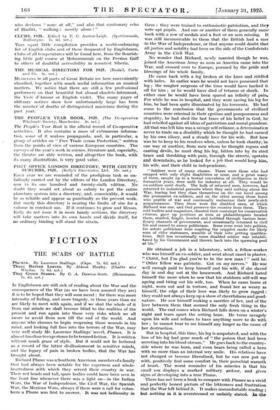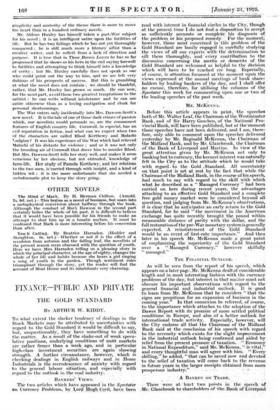FICTION
THE SCARS OF BATTLE
, Plumes. By Laurence Stallings. (Cape. 7s. 6d. net.)
IF Englishmen are still sick of reading about the War and-the consequences of the War (as we have been assured they are) it is to be hoped that they will soon mend ; for there was more intensity of feeling, and more tragedy, in those years than we are likely to meet with again, and if we shut the whole of it from our minds we shall become blind to the realities of the present and run again into those very risks which we all swore to avoid from now till the end of the world. And anyone who chooses to begin reopening those wounds in his mind, and looking full face into the terrors of the War, may very well study Mr. Laurence Stallings' novel, Plumes. It is almost too close to experience to be termed fiction. It is written without much grace of style. But it could not be bettered as a record of the bitter disillusionment in sensitive minds, and the legacy of pain in broken bodies, that the War has brought about.
Richard Plume was a Southern American, member of a family that had always been notable for the eagerness and whole- heartedness with which they served their country in war., Their red heads and tall, spare bodies could have been seen in the front line whenever there was a fight on—in the Indian Wars, the War of Independence, the Civil. War, the Spanish War, the Mexican Wars, always if there were a call for volun; teens a Plume was first to answer. It was not bellicosity in
them : they were trained to enthusiastic patriotism, and they were apt pupils. And one or another of them generally came back with a row of medals and a foot or an arm missing. It was still inconceivable to them that the British had a case in the War of Independence, or that anyone could doubt that all justice and nobility had been on the side of the Confederate Army in the Civil War.
No wonder that Richard, newly married though he was, joined the American Army as soon as America came into the War, and crossed over to Europe, pursued by the pride and - blessings of his whole family.
He came back with a leg broken at the knee and riddled with holes. In earlier wars he would not have possessed that leg ; the rougher surgeons of the time would have hacked it off for him ; or he would have died of tetanus or shock. In either case he would have been spared an infinity of pain. For while he was in hospital, and they were saving his leg for him, he had been quite illuminated by his torments. He had come to the conclusion that the governments of civilized countries were criminal in their egotism and pompousness and stupidity, he had shed the last trace of his belief in God, he had rebelled against all ideas of patriotism and moral grandeur. All that was left him was a savage self-reliance, a determination never to trade on a disability which he thought he had earned by his own idiocy, and a steady love for his wife. But how was he to keep to his resolves when, unless he took charity, in one way or another, from men whom he thought rogues and canting devils, he must drag his leg, bitten into by its steel brace and throbbing with pain, through the streets, upstairs and downstairs, as he looked for a job that would keep him, his wife, and their child in independence.
," Soldiers were of many classes. There were those who had escaped with only slight disabilities or none, and a great many of them, caught up in a bestial convulsion of civilization in their formative years, were unfit for industry at all. They would be ex-soldiers until death. The bulk of returned men, however, had returned to industrial pursuits where they said nothing about the War, fearing lest they class themselves on the one hand among the permanent ex-soldiers, and oh the other among those bores who prattle of war and continually embarrass their newly-rich acquaintances. Then there were the disabled ones, of which Richard was one, and God preserve the country from them. They sold leaflets and magazines, shouted their contempt for conservative citizens, gave up positions as soon as philanthropists located them, snarled, fought, howled and hobbled through various bene- ficiary channels of government, and occasionally returned to civil life and ceased to annoy politicians. Some even went into politics, for astute politicians were combing the crippled ranks for likely sons of elder statesmen, sensible of their vote getting qualifica- tions. Still less occasionally some disabled soldier was rehabili- tated by his Government and thrown back into the spawning pool of life."
He obtained a job in a laboratory, with a fellow-worker who was himself an ex-soldier, and went about cased in plaster. " Christ, but I'm glad you're to be the new man I " said he. " Other fellow was patriotic. Got on my nerves." He was well enough paid to keep himself and his wife, if she slaved day in and day out at the housework. And Richard hated himself the more when he saw that his stubborn self-will was ageing and tiring out his wife, too. When he came home at night, worn out and in torture, and found her as weary as himself, the edge of their love was likely to grow ragged : they could not always keep up a show of cheerfulness and good- nature. He saw himself making a sacrifice of her, and of the love between them that seemed the only fresh thing in the world. The end comes when Richard falls down on a winter's night and tears apart the setting bone. He turns savagely upon his wife and refuses to have anything more to do with her ; he cannot bear to see himself any longer as the cause of her destruction.
But in hospital, this time, his leg is amputated, and with the loss of his leg had gone much of " the poison that had been secreting into hii'blood-stream." He goes back to the country- side where he was born, and even bears being called a hero with no more than an internal wry smile. His relatives have not changed or become liberalized, but he can now put up with, positively find some comfort in, their parochial warmth of heart. The worst reminder of his miseries is that his small son displays a marked military ardour, and gives signs of developing into a true'Pluine.
There has not been a book to compare with Plumes as a vivid and perfectly honest picture of the bitterness and frustration that the-War left hehind it. • It makes Uncomfortable reading: but nothing in it is overstressed or unfairly stated. -La -the simplicity and austerity of the theme there -is more to move the heart thin. in a hundred ordinary novels.
Mr. Aldous Huxley has himself taken a pctst-War subject for his novel -; it is an intelligent satire upon the futilities of life. But he has two failings which he has not yet thoroughly conquered : he is still much more a literary artist than a creative writer, and he suffers from a lack of direction and purpose. It is true that in Those 13tirren Leaves he has so far progressed that he shows us his hero in the end saying farewell to futilities and attempting to think himself into a knowledge of verity ; but Mr. Huxley carefully dries not speak as one who could point out the way to him, and we are left very dubious of his prospects of success. But this is- grumbling at what the novel does not contain ; we should be thankful, rather,' that Mr. Huxley has .grovin so much. He can now, for the most part, avoid those two greatest temptations to the satirist : he can write without_intolerance and he can use satire otherwise than as a loving castigation and cloak for personal shortcomings.
The War enters only incidentally into Mrs. Dawson-Scott's new-novel. It is the tale of one of those dark crimes-of passion which,- our novelists would persuade us, are the commonest features of English country life. Cornwall, in especial, has an evil reputation in fiction, and what can we expect when two of the characters are called Rhod Kerthewy and Malachi Tadgian ? It was his experience of the War which had relieved Malachi of his distaste for violence ; and so it was not only the brooding air of Cornwall that drove him to murder Rhod. But Mrs. Dawson-Scott tells her story well, and makes it seem veracious by her • obvious, but not obtruded,' knowledge of farm-life. Her study of Pamela Kerthewy, and her relations to the two men, is'earried through with insight, and a kind of hidden wit : it is the more unfortunate that she needed a melodramatic plot to keep the story going.















































 Previous page
Previous page